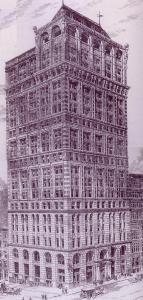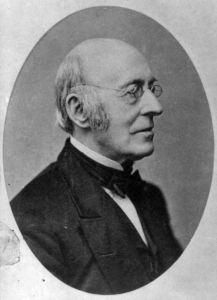In which we witness a profusion of people who think they know how to make the world a better place (and who may be right)
- American Tract Society Headquarters
Boys and girls, I’d like you meet Brianna.
—“Boys and girls?” Really?
That’s right, Emily: boys and girls. Good morning, Brianna.
—Good morning.
Boys and girls, I want everyone to heartily wish Brianna a good morning.
—Good morning.
C’mon now! With spirit!
—Good morning!
Better. Thank you. Brianna is a representative for our local chapter of the American Tract Society.
—What’s the American Tract Society?
So glad you asked, dear Sadie. The American Tract Society, or ATS, was founded about 15 years ago, in 1825, as an evangelical outreach organization.
—We’re in 1840 now?
—Duh. Do the math.
—I get kinda lost when he just, like parachutes into history like this.
The ATS publishes pamphlets on all kinds of social issues. It’s buried the country in a blizzard of paper on all the major social issues, seeking social reforms in Christ’s name.
—Like what?
Like temperance, for example.
—Temperance? What the hell is temperance?
I suggest you watch your language, young man. Temperance is the effort to cure our nation of the scourge of alcohol. This is a good opportunity to introduce Jonah. His confusion notwithstanding, Jonah is a member of the Washingtonian Society. He’s a former drunkard who travels in our area delivering speeches on how drinking almost destroyed his life. But also how he has since saved it. Jonah believes alcohol should be illegal.
—Really? I do?
Of course you do. There are some anti-drinking activists who think that only hard spirits like whiskey should be banned. But Jonah knows that beverages like beer and cider are also deeply pernicious. He understands that people make mistakes, there are lapses. And he shows compassion for such people, just as Kylie does. (It’s one of the reasons Jonah draw such large audiences.) But it’s important to call things by their real names, and Jonah pulls no punches: drinking is evil.
—What does Kylie have to do with this?
Isn’t it obvious, Sadie?
—Sorry, I guess I’m clueless.
Now, now, dear Sadie, I appreciate your modesty, but there’s no need to disparage the frailties of the weaker sex.
—You’re laying it on there a little thick there, Mr. K.
Kylie is a prison reformer. She believes that people sent to jail are not irredeemable—she hates the sin but hates the sinner. She believes that through a process of penance convicted criminals can return from prison to a productive role in society. That’s why she calls jails “penitentiaries.”
—I can’t wait to hear who I am.
Oh, dear Emily, such the jokester! As we all know, you’re an advocate of diet reform. You’ve been out to Battle Creek, Michigan as a disciple of Mr. Kellogg. You’re a vocal exponent of Sylvester Graham’s crackers. To hear you tell it, better food makes for healthier bodies. And healthier bodies make for a healthier society.
—Great. So corn flakes are my idea of a good time. Thanks a lot, Mr. K.
Well, that’s not all. You’re also an activist for women’s suffrage.
—Suffrage?
—The vote, Jonah. Emily believes women should be able to vote.
—Now that’s more like it, Mr. K. There’s a movement that really makes sense.
Well, not everybody. There are lots of people opposed to women getting the vote.
—Well, as you know, men are idiots.
Not all those opponents are men. Many women are concerned that women will lose important protections if they’re considered equal to men, which they don’t think they are.
—Well, then, they’re idiots, too.
You’re talking about a large majority of Americans in this Year of Our Lord 1840, Emily.
—Yeah, well, the large majority of Americans have always been idiots.
—Hey Em, the majority of Americans are women. So women are idiots?
—Idiocy is an equal-opportunity thing, Ethan. As you should know.
I take it you’re not a democrat, Emily. Or a Democrat, for that matter.
—Yeah, well, aren’t you the one who says the United States is a republic? Didn’t you say the Founding Fathers considered “democracy” a four letter word?
—That was “party,” Em. They considered political parties bad.
—Whatever.
One more thing, Emily. Besides your interest in dietary reform and women’s suffrage, you’re also an abolitionist.
—You mean I’m against slavery?
That’s putting it mildly. Some people think slavery is wrong. You, by contrast, are a flaming Garrisonian.
—I don’t know if I like the sound of that, Mr. K.
—I don’t know what that that actually means. But it sure sounds like Emily to me.
—Shut up, Ethan.
- William Lloyd Garrison
Emily is a dedicated supporter of William Lloyd Garrison. Before Garrison came along, most antislavery activism had actually come from Southerners. They worked through organizations like the American Colonization Society, founded in 1816. People like Thomas Jefferson, James Madison, and Henry Clay. All slaveholders. They idea is that they would buy freedom for slaves, and pay for their passage back to Africa—specifically to a tract of land they bought called Liberia. It’s capital was dubbed Monrovia, after President James Monroe.
—Did a lot of slaves go back to Africa?
—I doubt it. Sounds like a dumb idea.
No, not many did. The idea retained currency through the Civil War—Abraham Lincoln was among those who had high hopes for it even after he became president—but Garrison was among those who thought it was ridiculous. Garrison started a newspaper, The Liberator, in 1831, that aggressively promoted ending slavery immediately: that made him an immediatist, as opposed to gradualist abolitionists. Emily, of course, was an immediatist.
—Damn straight. When it comes to ending slavery, gradual is ridiculous. As ridiculous as a Graham cracker.
—Hey! I like Graham crackers!
Kids, let’s step back for a minute. I’ve reeled off a bunch of reform movements that were active in the 1830s and 40s: temperance, prison reform, dietary reform, suffrage, abolition. There were others too, like more humane treatment for the mentally ill, and sex reform.
—Oooh. I like the sound of that. How did it work?
Well, there were different kinds. The Shakers, for instance, founded communities were there was no sex at all. Oneida, by contrast, was a Midwestern colony that practiced “free love.” Both created complications.
—Didn’t the Shakers make furniture?
They did. But to return to my question: when you step back and survey all this, what do you think? Does it strike you as unusual? Does it impress you?
—Aren’t there always people who are trying to make the world a better place?
Yes, Kylie, there are. My question is whether this collection strikes you as compelling in terms of its varieties or intensity.
—I guess it does.
Well, if so, why do you think it’s happening?
—Well, you seem to think it has to do with religion. We talked about the Great Awakening. And you started the class with the American Tract Society.
Another apt observation, from Yin. It’s true: I do see evangelical Protestantism—the core of which is that improvement—as crucial here. As I think I mentioned to you a while back, Southerners tended to think about improvement in personal terms. Northerners tended to think about it more collectively. All these movements I’m talking about, with the partial exception of temperance, were rooted in the North.
—There’s something about this that rubs me the wrong way.
—Whaddya mean, Adam? You like slavery? You don’t think women should vote?
—That’s not what I’m saying. There’s something arrogant about these people.
—Where do you get that?
—I dunno. It’s just … they seem to have all these ideas. And a lot of them are about fixing other people. Do these abolitionists even know anything about slavery?
—What is there to know? Are you saying there’s a good side to it?
—No, that’s not my point. I don’t know anything about those colonizationists. My guess is that I wouldn’t be one of them, either. But at least they knew something about slavery, even if they weren’t slaves themselves.
—Well, what about Jonah, who’s a member of that group …
The Washingtonians.
—Right. The Washingtonians. They’re former drinkers. And women know something about being women, don’t they?
—I guess. I can’t quite put my finger on it. There’s something about these people that bugs me.
Well, Adam, without saying that you’re right, I’ll note that plenty of other people were bugged by these people, too. Some of them, predictably, were Southern slaveholders. But they weren’t the only ones. By and large, these people were Whigs. Jacksonian Democrats tended to oppose the reformers. And the reformers had prejudices of their own.
—Like what? Like who?
Like an aversion to those drunken Irish. Disgusting. And there’s just too damned many of them. Forgive me. I’m being a little indiscreet.
—Please don’t. Let’s hear more.
Tomorrow. And in the meantime, let’s come up with a plan to keep them out.
—We’ll build a wall.
That’s the idea.
Next: Drunken rabbits

